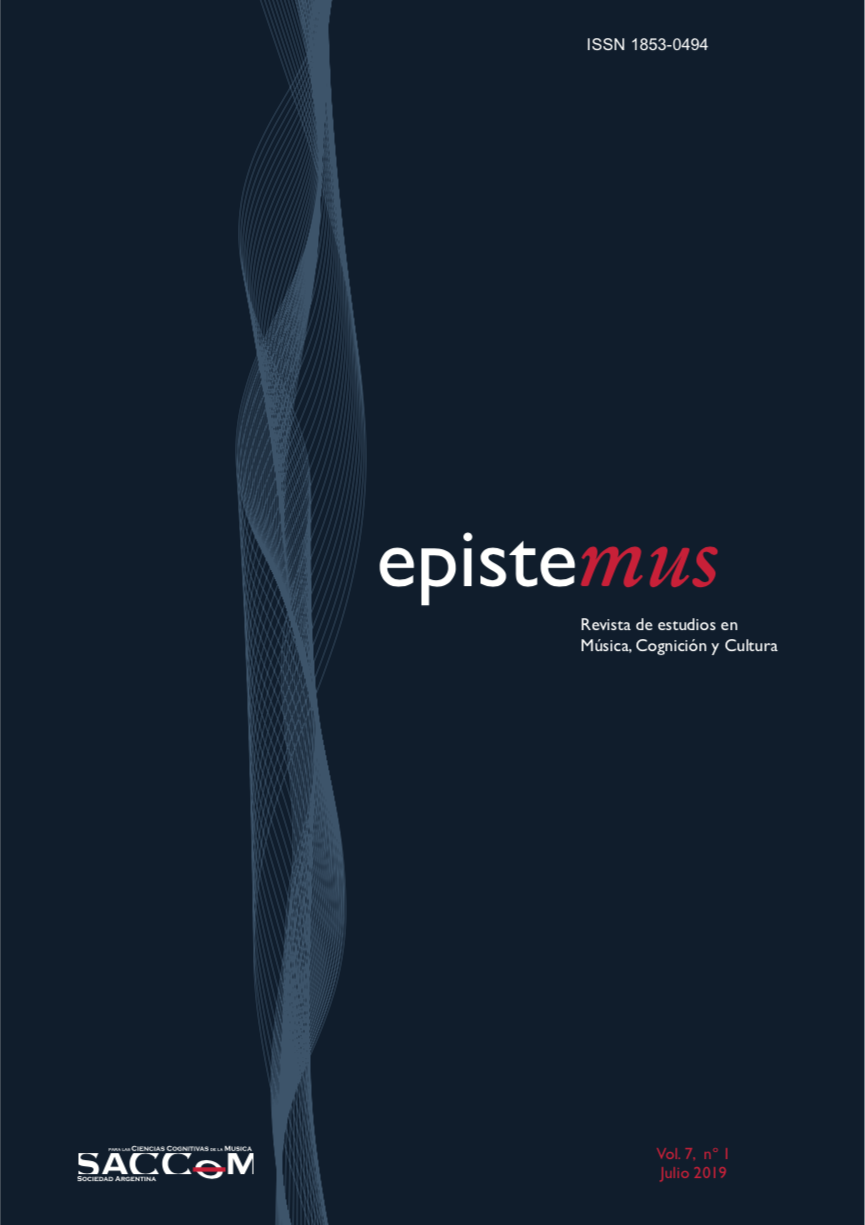Musical proposals to modulate the emotional verbal memory of young adults with or without musical training
DOI:
https://doi.org/10.24215/18530494e003Keywords:
musical learning, reproduction, improvisation, modulation, cognitionAbstract
In the last years, studies about the cognitive effect of music have focused their search on activities and stimulations that modulate cognitive functions, memory included. The aim of the present article was to investigate the effect of musical learning and the use of focal musical interventions in verbal memory. Young musicians and non-musicians participated, who learnt a list of words, followed by participation in a musical activity of reproduction or improvisation, with a rest control group. Finally, memory was evaluated through two tasks (free recall and recognition) immediately and deferred (7 days later). The results obtained, through the analysis of covariance, indicated that musical proposals enhanced memory, whit differences between reproduction and musical improvisation. On the other hand, it was found that musicians exhibit a better performance in the mnemonic task than non-musicians. These findings allow us to identify the potentialities of music, specifically musical learning and exposure to focal proposals, as modulators of human cognition
Downloads
Metrics
References
Benz, S., Sellaro, R., Hommel, B., & Colzato, L. (2016). Music makes the world go round: The impact of musical training on non-musical cognitive functions. A review. Frontiers in Psychology, 6: 2023. doi: 10.3389/fpsyg.2015.02023
Bruscia, K. (1998). Musicoterapia. Métodos y prácticas. México: Editorial Pax México.
Bruscia, K. (1999). Modelos de Improvisación en Musicoterapia. España: Agruparte Victoria –Gasteiz.
Cheung, M., Chan, A. S., Liu, Y., Law, D., & Wong, C. W. Y. (2017). Music training is associated with cortical synchronization reflected in EEG coherence during verbal memory encoding. PLoS ONE 12(3): e0174906. https://doi.org/10.1371/journal.pone.0174906
Diaz Abrahan, V., Shifres, F., & Justel, N. (2018). Music improvisation modulates emotional memory. Psychology of Music, 9, 1-16. doi: 10.1177/0305735618810793.
Diaz Abrahan, V., Shifres, F., & Justel, N. (2019). Cognitive benefits from a musical activity in older adults. Frontiers in Psychology, 10, 652. doi: 10.3389/fpsyg.2019.00652
Engel, A. K., Fries, P., & Singer, W. (2001). Dynamic predictions: oscillations and synchrony in top-down processing. Nature Reviews Neuroscience, 2(10), 704–716. doi: 10.1038/35094565
Faul, F., Erdfelder, E., Lang, A., & Buchner, A. (2007). G* Power 3: A flexible statistical power analysis program for the social, behavioral, and biomedical sciences. Behavior Research Methods, 39(2), 175-191. doi: 10.3758/BF03193146
Fauvel, B., Groussard, M., Mutlu, J., Arenaza-Urquijo, E. M., Eustache, F., Desgranges, B., & Platel, H. (2014). Musical practice and cognitive aging: two cross-sectional studies point to phonemic fluency as a potential candidate for a use-dependent adaptation. Frontiers in Aging Neuroscience, 6, 227. doi: 10.3389/fnagi.2014.00227
Ferreri, L., Aucouturier, J.-J., Muthalib, M., Bigand, E., & Bugaiska, A. (2013). Music improves verbal memory encoding while decreasing prefrontal cortex activity: an fNIRS study. Frontiers in Human Neuroscience, 7, 779. doi: 10.3389/fnhum.2013.00779
Fujioka, T., Trainor, L., Ross, B., Kakigi, R., & Pantev, C. (2004). Musical training enhances automatic encoding of melodic contour and interval structure. Journal of Cognitive Neuroscience, 16(6), 1010-1021. doi: 10.1162/0898929041502706
Ho, Y. C., Cheung, M. C., & Chan, A. S. (2003). Music training improves verbal but not visual memory: Cross-sectional and longitudinal explorations in children. Neuropsychology, 17(3), 439–450. doi: 10.1037/0894-4105.17.3.439
Judde, S. & Rickard, N. (2010). The effect of post-learning presentation of music on long term word list retention. Neurobiology of Learning and Memory, 94, 13-20.
Justel, N., & Diaz Abrahan, V. (2012). Plasticidad cerebral: Participación del entrenamiento musical. Suma Psicológica, 17(2), 97-108.
Justel, N., & Rubinstein, W. (2013). La exposición a la música favorece la consolidación de los recuerdos. Boletín de Psicología, 109, 73-83
Justel, N., Abrahan, V., Castro, C., & Rubinstein, W. (2016). Efecto de la música sobre la memoria emocional verbal. Anuario de Psicología, 22(2), 297-301.
Klein, C., Franziskus, F., Hanggi, J., Elmer, S., & Jancke, L. (2016). The “Silent” imprint of musical training. Human Brain Mapping, 37(2), 536–546. doi: 10.1002/hbm.23045
Moayeri, S., Cahill, l., Jin, I., & Potkin, S. (2010). Relative sparing of emotionally influenced memory in Alzheimer's disease. Neuroreport, 11(4), 653-655. doi: 10.1097/00001756-200003200-00001.
Pantev, C., & Herholz, S. (2011). Plasticity of the human auditory cortex related to musical training. Neuroscience Biobehavioral Reviews, 35(10), 2140-2154. doi: 10.1016/j.neubiorev.2011.06.010
Patil, A., Murty, V., Dunsmoor, J., Phelps, E., & Davachi, L. (2016). Reward retroactively enhances memory consolidation for related items. Learning & Memory, 24, 65-69. doi: 10.1101/lm.042978.116
Peretz, I. (2006). The nature of music from a biological perspective. Cognition, 100(1), 1-32. doi: 10.1016/j.cognition.2005.11.004
Psyrdellis, M., Diaz Abrahan, V., Cetratelli, C., & Justel, N. (2017). Rock influences spatial memory in adult rats, while classical music do not. Psicológica: Revista de metodología y psicología experimental, 38(2), 177-193.
Raichle, M. E. (2010). Two views of brain function. Trends in Cognitive Science, 14, 180–190. doi: 10.1016/j.tics.2010.01.008
Redondo, J., Fraga, I., Padr;on, I., & Comesaña, M. (2007). The Spanish adaptation of ANEW (Affective Norms for English Words). Behavior Research Methods, 39 (3), 600-605. doi: 10.3758/BF03193031
Rickard, N., Toukhsati, S., & Field S. (2005). The effect of music on cognitive performance: Insight from neurobiological and animal studies. Behavioral and Cognitive Neuroscience Reviews, 4, 235-261. doi: 10.1177/1534582305285869
Rickard, N., Wing Wong, W. & Velik, L. (2012). Relaxing music counters heightened consolidation of emotional memory. Neurobiology of Learning & Memory, 97, 220-228.
Schlaug, G., Jancke, L., Huang, Y., Staiger, J., & Steinmetz, H. (1995). Increased corpus callosum size in musicians. Neuropsycholo¬gia, 33(8), 1047-1055. doi: 10.1016/0028-3932(95)000-45-5
Schlaug, G., Norton, A., Overy, K., & Winner, E. (2005). Effects of music training on the child’s brain and cognitive development. Annals of New York Academy of Sciences, 1060, 219-230. doi: 10.1196/annals.1360.015.
Schwarze, U., Bingel, U., & Sommer, T. (2012). Event-related nociceptive arousal enhances memory consolidation for neutral scenes. The Journal of Neuroscience, 32(4), 1481-1487. doi: 10.1523/JNEUROSCI.4497-11.2012
Seung, Y., Kyong, J., Woo, S., Lee, B. & Lee, K. (2005). Brain activation during music listening in individuals with or without prior music training. Neuroscience Research, 52(4), 323-329. doi: 10.1016/j.neures.2005.04.011.
Squire, L. R. (1987). Memory and Brain. New York: Oxford University Press.
Talamini, F., Altoè, G., Carretti, B., & Grassi, M. (2018). Musicians have better memory than nonmusicians: A meta-analysis. PLoS ONE, 13(1), e0191776. doi: 10.1371/journal.pone.0191776
Talmi, D. (2013). Enhanced emotional memory: Cognitive and neural mechanisms. Current Directions in Psychological Science, 22(6), 430-436.
Vaughn, K. (2000). Music and mathematics: Modest support for the oft-claimed relationship. Journal of Aesthetic Education, 34(3/4), 149–166. doi: 10.2307/3333641
Wang, X., Ossher, L., & Reuter-Lorenz, P. A. (2015). Examining the relationship between skilled music training and attention. Consciousness & Cognition, 36, 169–179. doi: 10.1016/j.concog.2015.06.014.
Watanabe, D., Savion-Lemieux, T., & Penhune, V., (2007). The effect of early musical training on adult motor performance: evidence for a sensitive period in motor learning. Experimental Brain Research, 176(2), 332-40. doi: 10.1007/s00221-006-0619-z
Downloads
Published
How to Cite
Issue
Section
License
Politica vigente desde octubre de 2019
La aceptación del manuscrito por parte de la revista implica la cesión no exclusiva de los derechos patrimoniales de los/as autores/as en favor del editor, quien permite la reutilización, luego de su edición (postprint), bajo una Licencia Creative Commons Atribución-NoComercial-CompartirIgual 4.0 Internacional (CC BY-NC-SA 4.0)
Acorde a estos términos, el material se puede copiar y redistribuir en cualquier medio o formato siempre que a) se cite la autoría y la fuente original de su publicación (revista y URL de la obra), se brinde el acceso a la licencia y se indique si se realizaron cambios; b) no se utilice el material para fines comerciales.
La cesión de derechos no exclusivos implica que luego de su edición (postprint) en Epistemus los/as autores/as pueden publicar su trabajo en cualquier idioma, medio y formato; en tales casos, se solicita que se consigne que el material fue publicado originalmente en esta revista.
Tal cesión supone, también, la autorización de los/as autores/as para que el trabajo sea cosechado por SEDICI, el repositorio institucional de la Universidad Nacional de La Plata, y sea difundido en las bases de datos que el equipo editorial considere adecuadas para incrementar la visibilidad de la publicación y de sus autores/as.
Asimismo, la revista incentiva a los/as autores/as para que luego de su publicación en Epistemus depositen sus producciones en otros repositorios institucionales y temáticos, bajo el principio de que ofrecer a la sociedad la producción científica y académica sin restricciones contribuye a un mayor intercambio del conocimiento global.

















